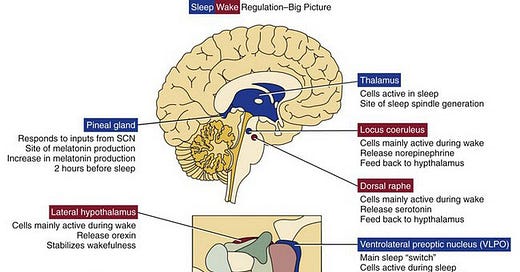Why do we sleep? To rest is the obvious answer. But on closer inspection it becomes a bit of a mystery that many researchers have tried to answer. Cells don’t need sleep, so why do animals - particularly mammals? Moreover, from an evolutionary perspective lying comatose for a third of a day may seem to increase our risk of being attacked and eaten. It sounds like a bad thing to do. So, what sounds like a stupid question actually becomes a bit of a conundrum. It must also outweigh the negative side i.e. being inactive and at risk of attack for about a third of the day.
However, in contrast to making no evolutionary sense, it must make a lot of evolutionary sense, otherwise we wouldn’t have it. It is the result, in short, of having a brain. As Hobson et al. writing in Nature in 2005 noted: it is “of the brain, by the brain, for the brain”. The consequence of having a complex, adaptable nervous system is that it needs to reset, detoxify, rebuild, and build new connections from the day’s experiences and challenges. Other researchers, such as Tononi and Cirelli have called it “The Price of Plasticity”, if you want to have a brain that can rebuild and grow, you will need to have something like sleep where the brain can commit resources to rebuilding instead of just operating.
Let’s look in a little more detail at sleep and the processes at play.
Keep reading with a 7-day free trial
Subscribe to leading brains Review to keep reading this post and get 7 days of free access to the full post archives.




